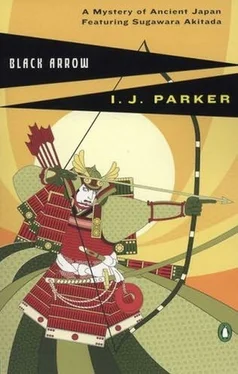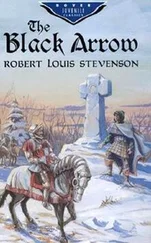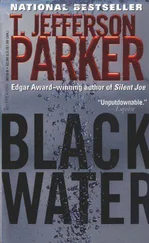I. Parker - Black Arrow
Здесь есть возможность читать онлайн «I. Parker - Black Arrow» весь текст электронной книги совершенно бесплатно (целиком полную версию без сокращений). В некоторых случаях можно слушать аудио, скачать через торрент в формате fb2 и присутствует краткое содержание. Год выпуска: 2006, ISBN: 2006, Издательство: Penguin, Жанр: Исторический детектив, на английском языке. Описание произведения, (предисловие) а так же отзывы посетителей доступны на портале библиотеки ЛибКат.
- Название:Black Arrow
- Автор:
- Издательство:Penguin
- Жанр:
- Год:2006
- ISBN:9780143035619
- Рейтинг книги:5 / 5. Голосов: 1
-
Избранное:Добавить в избранное
- Отзывы:
-
Ваша оценка:
- 100
- 1
- 2
- 3
- 4
- 5
Black Arrow: краткое содержание, описание и аннотация
Предлагаем к чтению аннотацию, описание, краткое содержание или предисловие (зависит от того, что написал сам автор книги «Black Arrow»). Если вы не нашли необходимую информацию о книге — напишите в комментариях, мы постараемся отыскать её.
Black Arrow — читать онлайн бесплатно полную книгу (весь текст) целиком
Ниже представлен текст книги, разбитый по страницам. Система сохранения места последней прочитанной страницы, позволяет с удобством читать онлайн бесплатно книгу «Black Arrow», без необходимости каждый раз заново искать на чём Вы остановились. Поставьте закладку, и сможете в любой момент перейти на страницу, на которой закончили чтение.
Интервал:
Закладка:
The handsome man was Sunada. Since he was wearing a sumptuous dark silk gown and had a very refined manner, Akitada was startled when Uesugi introduced him as a merchant. Sunada bowed very deeply and murmured something about being honored.
The other three men Uesugi summed up dismissively with a wave of his stubby hand: “Oyoshi’s the pharmacist, Hisamatsu’s the judge, and you’ve already met Kaibara.”
So the ugly old man was a pharmacist, and the pudgy fellow the judge. The pharmacist was of no interest to Akitada, but the judge was another matter. He must be the one Tora and Hitomaro had had the run-in with earlier that day. That suggested a certain hostility toward the new administration. Akitada, who had placed first in law at the university and served in the Ministry of Justice in the capital, intended to take a personal interest in legal matters here.
But for the moment, he said politely, “I have been looking forward to meeting the local notables,” then took his place on a cushion next to his host.
The others seated themselves on either side by some prearranged system of protocol which placed the most important closest to Akitada and Uesugi. It put the abbot on Akitada’s left, and Captain Takesuke on Uesugi’s right. Sunada and Oyoshi sat farthest away. Uesugi clapped his hands, and four handsome serving women in softly colored silk gowns entered to pour wine into gold-speckled lacquer cups and to place these and pickled vegetables in small gilded bowls on the elegant lacquer trays before each guest.
Time for more compliments. Akitada leaned toward his host. “You spoil your Quests, Uesugi. The entertainment promises to be most impressive.”
“Thank you, Excellency, but the test of a banquet is the food and wine. I’m afraid that you will find our rough fare a sad disappointment after the capital.”
Akitada made a polite disclaimer. He inspected the food, which soon appeared in a rapid succession of pretty bowls and plates. His nausea had subsided, but he sampled cautiously. The prevailing taste seemed to be of some tongue-burning spice. “Excellent,” he told Uesugi. “Spicier than the food at home but very flavorful. And the wine is superb.” It served to put out the fire in his mouth and throat.
The stiff courtesies to his host over, Akitada turned to the guests, who were a curiously ill-assorted group. By cautious questioning he discovered that the merchant Sunada was a wholesaler with connections along the northern circuit and an intimate knowledge of shipping along the coast. He reconsidered his earlier judgment. Such a man had experience and could be very useful to a new governor. Unless, of course, he was already useful to his enemies.
The judge was a disappointment. Akitada’s inquiries about local crime met with a pedantic lecture on the advantages of instituting the harsh Chinese system of punishment. Akitada was a staunch Confucianist himself, but he knew that Japanese customs and conditions were quite different from those in China, and that anyone who applied Chinese precepts too rigidly knew little about legal history. In any case, it was the periodic release of violent criminals from jails, whenever the emperor felt like having an amnesty, that caused problems, not the lack of executions or mutilations. Under the Chinese system, a judge had to watch as his sentence was carried out, and Akitada wondered at Hisamatsu’s interest in the various torturous methods of killing a man or woman. He seemed to take inordinate pleasure in detailing their finer points.
Akitada tugged at his collar and shifted a little. He was getting hot. The wine, the spicy food, and the proximity of a large brazier at his back made perspiration bead his face and neck.
The pharmacist, who apparently also was a physician, puzzled him. What was he doing here? A small, ugly, and almost hunchbacked man, he had lively black eyes which kept watching Akitada in a penetrating and searching manner. He decided that Oyoshi was present because he was the Uesugi family’s doctor and there was illness in the house.
Reminded by this of an oversight, Akitada turned to his host. “How is your honorable father these days? I was very sorry to hear he is not well.”
“Your Excellency is most kind. My father’s poor health is the reason I have not left for the frontier. My place is in battle, defending his Majesty’s territories against the northern barbarians, but how can a dutiful son leave his father’s bedside when he fears for his life?”
Uesugi did not look the eager soldier, nor the doting son, but Akitada said, “I am sorry to hear his condition is so serious. Can nothing be done?”
“My father is in his eightieth year. At his age decline must be expected.”
A brief silence fell. Then Oyoshi said, “I shall be more than happy to look in on your honorable father now, if you wish, sir. Luckily I have brought my medicines with me.”
“Under no circumstance,” Uesugi snapped. “My father is already asleep.” Seeing Akitada’s astonishment at this rudeness, he flushed and added more quietly, “Besides, you are my guest tonight, Oyoshi. Enjoy your food and wine!”
Oyoshi bowed and turned his attention back to his tray.
They had done justice to three courses already, broiled salmon, stewed abalone, and a vegetable dish containing slices of bean curd, all of it highly spiced, when Akitada became aware of a peculiar gurgling discomfort in his belly. Recalling Seimei’s questions, he wondered if he would finish his dinner without disgracing himself. He dabbed at his streaming face with a sleeve and sighed inwardly. He had rarely been this uncomfortable.
His host leaned toward him. “Will your Excellency be sending any dispatches to the capital before the snows close the roads?” he asked.
“Certainly. I report on a regular basis,” Akitada said, momentarily distracted from his troubles by the intense interest in Uesugi’s face.
Uesugi laughed and some of the others joined in. “Oh, my dear sir. Nothing happens here on a regular basis once the snows come, least of all dispatches or mail. The roads will be impassable until the beginning of summer. We will be completely cut off from the capital. If your Excellency plans to send a messenger, it had better be soon. Takesuke has some good men. I ask because the matter of my confirmation as high constable of the province is overdue.”
So that was it! The real reason for this invitation: Makio Uesugi wanted that appointment shifted from his ailing father to himself. To save the expense of large standing armies in distant and unsafe provinces, the government had taken to appointing high constables from among local noblemen and landowners, and had given them the power to collect taxes and enforce laws by using their own retainers. Makio Uesugi’s father had held this position, and now his son aspired to it. It conveyed upon the holder not only power, but almost certain wealth, as a good portion of the collected taxes found its way, legally or otherwise, into a high constable’s coffers.
Akitada was on principle opposed to the practice because it gave too much power to local men and diminished the authority of the governors. He certainly had no intention of acceding in the present case. Now he said evasively, “I shall give your request serious thought. If the weather conditions are indeed as you say, I must make my recommendations as soon as possible. Still, the province seems very peaceable. There has been amazingly little legal business since I arrived.”
A flash of anger passed over the other man’s face, but he merely bowed.
Takesuke said, “A person like yourself, Excellency, newly arrived from the capital, will not yet have an idea of local conditions. I am certain that I speak for General Uesugi as well as myself when I offer your Excellency my full assistance in military matters.”
Читать дальшеИнтервал:
Закладка:
Похожие книги на «Black Arrow»
Представляем Вашему вниманию похожие книги на «Black Arrow» списком для выбора. Мы отобрали схожую по названию и смыслу литературу в надежде предоставить читателям больше вариантов отыскать новые, интересные, ещё непрочитанные произведения.
Обсуждение, отзывы о книге «Black Arrow» и просто собственные мнения читателей. Оставьте ваши комментарии, напишите, что Вы думаете о произведении, его смысле или главных героях. Укажите что конкретно понравилось, а что нет, и почему Вы так считаете.












